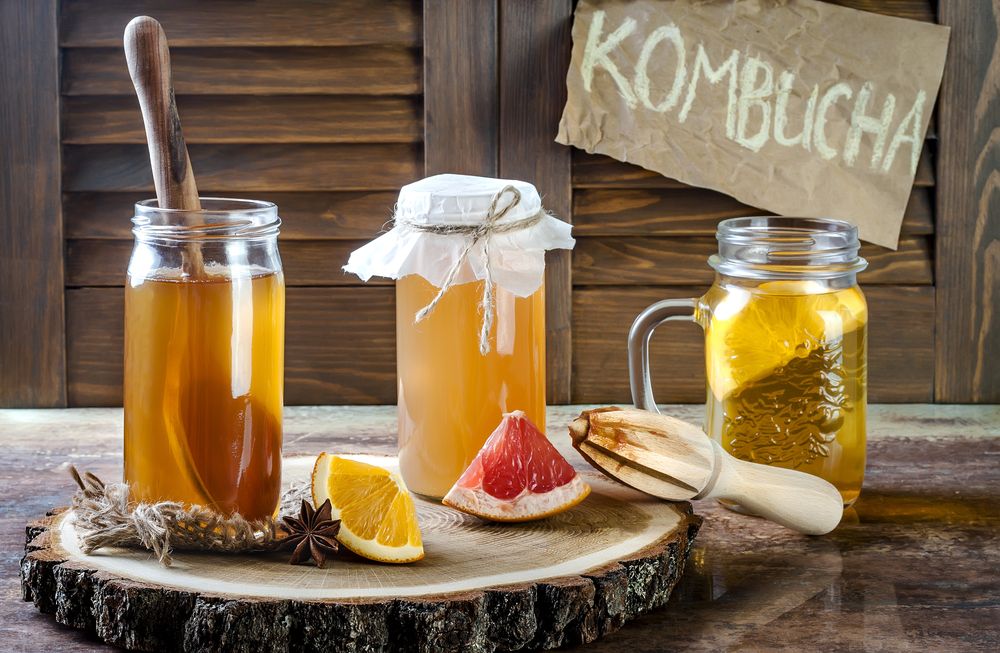
As demand for functional beverages continues to surge, grocery store coolers are brimming with healthier soda alternatives like prebiotic sodas, kefir water, and kombucha. Kombucha, a beverage with roots dating back to 220 B.C., has experienced a meteoric rise in popularity in recent years. Today, well-stocked grocery stores offer countless brands and flavor options, reflecting a trend that shows no signs of slowing. In fact, the kombucha market is projected to expand from $1.8 billion in 2024 to an impressive $6.2 billion by 2032.
However, before you make kombucha a daily ritual, it’s essential to separate fact from fiction. Despite its ancient origins and wellness claims, much of the evidence supporting kombucha's health benefits remains anecdotal, lacking robust scientific validation. While most people can enjoy an occasional glass without issue, adopting it as a daily habit warrants careful consideration.
As a dietitian with a soft spot for a fizzy ginger kombucha—and some hands-on experience crafting my own at home—I decided to dive into the research to uncover what science really says about kombucha’s health benefits, as well as potential reasons to limit or avoid this bubbly fermented drink. Keep reading to learn more, and don’t miss I Drank Kombucha for 30 Days & Experienced 3 Life-Changing Benefits for additional insights.
What Is Kombucha?

Kombucha is a fermented tea made by combining black or green tea with sugar and a SCOBY (Symbiotic Culture of Bacteria and Yeast). If you’ve never encountered a SCOBY, it’s a jelly-like, disc-shaped blob that floats atop the fermenting kombucha. While its appearance might not win any beauty contests, the SCOBY is the key to transforming plain tea into a tangy, fizzy drink loaded with probiotics.
To preserve these probiotics, most kombucha is sold raw and unpasteurized. While this is generally safe for healthy individuals, it may pose risks for children or those with weakened immune systems.
Once a centuries-old home-brew tradition, kombucha’s skyrocketing popularity has ushered in a wave of commercial production. Today, raw, unpasteurized kombucha is a staple in most well-stocked grocery stores, offering a wide array of flavors for every palate.
Kombucha Nutrition Facts
The nutritional content of kombucha varies depending on the brand and ingredients used, but most 12-ounce bottles provide approximately:
- Calories: 60
- Fat: 0 g
- Sodium: 7 mg
- Carbs: 15 g
- Fiber: 0 g
- Sugar: 15 g
- Protein: 0.3 g
Kombucha typically contains 40–50 milligrams of caffeine due to its tea base. During fermentation, natural yeasts convert sugars into trace amounts of alcohol, usually less than 0.5%. However, home-brewed kombucha can sometimes have higher alcohol content due to less controlled fermentation.
While kombucha generally offers negligible amounts of vitamins and minerals, some varieties that include fruit juice may contain small amounts of vitamin C, vitamin E, B vitamins, potassium, iron, and magnesium, enhancing its nutrient profile.
Benefits of Kombucha

It’s a Natural Probiotic
One of kombucha’s most celebrated benefits is its rich probiotic content. Produced by fermenting yeast and bacteria, kombucha is packed with live, active cultures that may help support a healthy gut microbiome.
Many commercial brands claim to deliver billions of CFU (colony-forming units) of probiotics per bottle. However, these counts can decrease over time. A March 2023 study published in Beverages found that only 16.3% of soft or soft-aberrant kombucha (alcohol content exceeding 0.5% but not considered "hard") contained a billion CFU of live probiotics when tested. Additionally, the specific bacterial species in kombucha vary widely, making it a potential gut-health booster but not a targeted solution for specific symptoms or conditions.
It’s High in Antioxidants
As a tea-based beverage, kombucha is a natural source of antioxidants and polyphenols, compounds that combat free radicals and reduce oxidative stress and inflammation in the body. Research shows that kombucha brewed with green tea contains the highest phenolic content, and the fermentation process may enhance the availability of these beneficial compounds.
It May Lower the Risk of Diabetes
Despite being made with sugar, kombucha is not a sugar-heavy drink, as much of the sugar is consumed during fermentation. A 2023 study revealed that drinking kombucha with a meal can lower postprandial blood sugar and insulin responses within two hours, compared to soda water or diet soda. Although the precise mechanism remains unclear, scientists attribute this effect to a combination of kombucha’s pH, microbial content, organic acids, polyphenols, and tannins.
It May Reduce the Risk of Heart Disease
Kombucha’s antioxidant properties may also benefit heart health. Animal studies suggest that kombucha can lower LDL cholesterol while raising HDL cholesterol, contributing to improved blood cholesterol levels. These effects are believed to stem from its impact on the gut microbiome and its ability to reduce oxidative stress. However, more research is needed to confirm these benefits in humans.
Potential Drawbacks of Kombucha

It Could Upset Your Stomach
While many people enjoy kombucha without issues, its acidity and carbonation can cause discomfort for those with sensitive stomachs, acid reflux, or IBS. The fermentation process produces a tangy, fizzy drink that may lead to bloating or digestive upset in some individuals. If you’re trying kombucha for the first time, start with a small serving to see how your body reacts and stop drinking if it exacerbates any digestive symptoms.
It May Pose Risks for Immunocompromised Individuals
Kombucha is most beneficial when consumed raw and unpasteurized, as this preserves its probiotic content. However, the lack of pasteurization also carries a small risk of harmful bacteria contamination. This can be problematic for those with compromised immune systems or young children, who should avoid raw kombucha to reduce the risk of illness.
It’s Tough on Your Teeth
Kombucha’s acidity is comparable to that of cola, which can accelerate enamel demineralization and tooth erosion if consumed regularly. To protect your teeth, consider drinking kombucha through a straw to limit contact with enamel, rinsing your mouth with water afterward, or brushing your teeth to mitigate its effects.
Conclusion: Is Kombucha Good for You?
Kombucha is a flavorful and refreshing drink with benefits that extend beyond typical sodas. Rich in probiotics and antioxidants, it supports gut health and helps combat oxidative stress.
However, while kombucha has its perks, it’s not a cure-all or without potential drawbacks. If you have IBS, acid reflux, or concerns about enamel erosion—or if you are immunocompromised—it’s best to approach kombucha with caution. Enjoy it as an occasional treat while being mindful of how your body responds.

